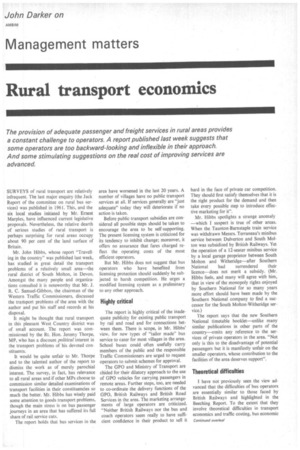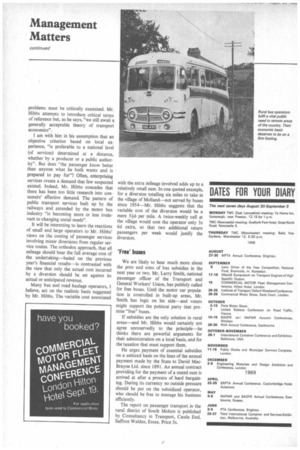Management matters
Page 61

Page 62

If you've noticed an error in this article please click here to report it so we can fix it.
Rural transport economics
The provision of adequate passenger and freight services in rural areas provides a constant challenge to operators. A report published last week suggests that some operators are too backward-looking and inflexible in their approach. And some stimulating suggestions on the real cost of improving services are advanced.
SURVEYS of rural transport are relatively infrequent. The last major enquiry (the Jack Report of the committee on rural bus services) was published in 1961. This, and the six local studies initiated by Mr. Ernest Marples, have influenced current legislative proposals. Nevertheless, the relative dearth of serious studies of rural transport is perhaps surprising for rural areas occupy about 90 per cent of the land surface of Britain.
Mr. John Hibbs, whose report -Travelling in the country" was published last week,
has studied in great detail the transport problems of a relatively small area—the rural district of South Molton, in Devon.
Amongst the many people and organiza tions consulted it is noteworthy that Mr. J. R. C. Samuel-Gibbon, the chairman of the Western Traffic Commissioners, discussed the transport problems of the area with the author and put his staff and records at his disposal.
It might be thought that rural transport in this pleasant West Country district was of small account. The report was commissioned by the Rt. Hon. Jeremy Thorpe, MP, who has a discount political interest in the transport problems of his devoted constituents.
It would be quite unfair to Mr. Thorpe and to the talented author of the report to dismiss the work as of merely parochial interest. The survey, in fact, has relevance to all rural areas and if other MPs choose to commission similar detailed examinations of transport facilities in their constituencies so much the better. Mr. Hibbs has wisely paid some attention to goods transport problems, though the main stress is on bus passenger journeys in an area that has suffered its full share of rail service cuts.
The report holds that bus services in the area have worsened in the last 20 years. A number of villages have no public transport services at all. If services generally are "just adequate" today they will deteriorate if no action is taken.
Before public transport subsidies are considered all possible steps should be taken to encourage the area to be self-supporting. The present licensing system is criticized for its tendency to inhibit change; moreover, it offers no assurance that fares charged reflect the operating costs of the most efficient operators.
But Mr. Hibbs does not suggest that bus operators who have benefited from licensing protection should suddenly be subjected to harsh competition. He urges a modified licensing system as a preliminary to any other approach.
Highly critical
The report is highly critical of the inadequate publicity for existing public transport by rail and road and for connections between them. There is scope, in Mr. Hibbs' view, for new types of "tailor made" bus service to cater for most villages in the area. School buses could often usefully carry members of the public and the responsible Traffic Commissioners are urged to request operators to submit schemes for approval.
The GPO and Ministry of Transport are chided For their dilatory approach to the use of GPO vehicles for carrying passengers in remote areas. Further steps, too, are needed to co-ordinate the delivery functions of the GPO, British Railways and British Road Services in the area. The marketing arrangements of large operators are criticized. "Neither British Railways nor the bus and coach operators seem really to have sufficient confidence in their product to sell it hard in the face of private car competition. They should first satisfy themselves that it is the right product for the demand and then take every possible step to introduce effective marketing for it".
Mr. Hibbs spotlights a strange anomaly —which I suspect is true of other areas. When the Taunton-Barnstaple train service was withdrawn Messrs. Terraneau's minibus service between Dulverton and South Molton was subsidized by British Railways. Yet the operation of a 12-seater minibus service by a local garage proprietor between South Molton and Witheridge—after Southern National had surrendered their licence—does not merit a subsidy. (Mr. Hibbs feels, and many will agree with him, that in view of the monopoly rights enjoyed by Southern National for so many years more effort should have been made by the Southern National company to find a successor for the South Molton-Witheridge service.)
The report says that the new Southern National timetable booklet—unlike many similar publications in other parts of the country—omits any reference to the services of private operators in the area. "Not only is this to the disadvantage of potential passengers but it is manifestly unfair on the smaller operators, whose contribution to the facilities of the area deserves support-.
Theoretical difficulties
I have not previously seen the view advanced that the difficulties of bus operators are essentially similar to those faced by British Railways and highlighted in the Beeching Report. To the extent that they involve theoretical difficulties in transport economics and traffic costing, bus economic problems must be critically examined. Mr. Hibbs attempts to introduce critical terms of reference but, as he says, "we still await a generally acceptable theory of transport economics".
I am with him in his assumption that an objective criterion based on local experience, "is preferable to a national level (of services) determined at a distance, whether by a producer or a public authority". But does "the passenger know better than anyone what he both wants and is prepared to pay for"? Often, enterprising services create a demand that few suspected existed. Indeed, Mr. Hibbs concedes that there has been too little research into consumers' effective demand. The pattern of public transport services built up by the railways and extended by the motor bus industry "is becoming more or less irrelevant to changing social needs".
It will be interesting to learn the reactions of small and large operators to Mr. Hibbs' views on the costing of passenger services involving minor diversions from regular service routes. The orthodox approach, that all mileage should bear the full average cost of the undertaking—baged on the previous year's financial results—is contrasted with the view that only the actual cost incurred by a diversion should be set against its actual or anticipated revenue.
Many bus and road haulage operators, I believe, act on the realistic basis suggested by Mr. Hibbs. The variable cost associated with the extra mileage involved adds up to a relatively small sum. In one quoted example, for a diversion totalling six miles to take in the village of Molland—not served by buses since 1954—Mr. Hibbs suggests that the variable cost of the diversion would be a mere 5+4 per mile. A twice-weekly call at the village would cost the operator only 5s 6d extra, so that two additional return passengers per week would justify the diversion.
'Free' buses We are likely to hear much more about the pros and cons of bus subsidies in the next year or two. Mr. Larry Smith, national passenger officer of the Transport and General Workers' Union, has publicly called for free buses. Until the motor car population is controlled in built-up areas, Mr. Smith has logic on his side—and voters might support the political party that promise "free" buses.
If subsidies are the only solution in rural areas—and Mr. Hibbs would certainly not agree unreservedly to the principle—he thinks there are powerful arguments for their administration on a local basis, and for the taxation that must support them.
He urges payment of essential subsidies on a unitized basis on the lines of the annual payment made by the State to David MacBrayne Ltd. since 1891. An annual contract providing for the payment of a stated sum is arrived at after a process of hard bargaining. During its currency no outside pressure should be put on the subsidized operator, who should be free to manage his business efficiently.
The report on passenger transport in the rural district of South Molton is published by Consultancy in Transport, Castle End, Saffron Walden, Essex. Price 5s.




















































































